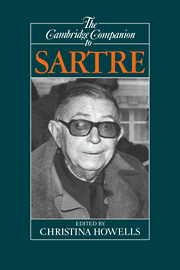Book contents
- Frontmatter
- Introduction
- Part I Phenomenology and existentialism
- Part II Psychology and ethics
- Part III History and structure
- 7 Sartre and the poetics of history
- 8 Sartre on progress
- 9 Sartrean Structuralism?
- Conclusion: Sartre and the deconstruction of the subject
- Appendix; Hegel and Sartre
- Bibliography
- Index
8 - Sartre on progress
from Part III - History and structure
Published online by Cambridge University Press: 28 May 2006
- Frontmatter
- Introduction
- Part I Phenomenology and existentialism
- Part II Psychology and ethics
- Part III History and structure
- 7 Sartre and the poetics of history
- 8 Sartre on progress
- 9 Sartrean Structuralism?
- Conclusion: Sartre and the deconstruction of the subject
- Appendix; Hegel and Sartre
- Bibliography
- Index
Summary
How does one of the twentieth century's great thinkers help us illuminate one of its great paradoxes? What does Sartre contribute toward clarifying the problem of thinking about history as it has emerged in the late twentieth century? After a century and a half of celebrating and living by the idea of progress, amidst staggering scientific-technological progress, almost no one in the West continues to believe in progress. In the current climate of intellectual disillusionment no serious thinker is willing to defend Bury's formulation that the world is slowly advancing in “a definite and desirable direction” leading to a “condition of general happiness” that will “justify the whole process of civilization.” On the one hand, the postmodernist temper shows, as Lyotard says, “incredulity toward metanarratives” such as the idea of progress. On the other, the current mood seems sympathetic toward negative metanarratives - those that suggest that things are getting worse. Witness, for example, the remarkable success of Allan Bloom's The Closing of the American Mind, or the works of Christopher Lasch - which suggest that as time goes by, we are losing the most vital of values, attitudes, and skills. The negative mood is starkly captured in Theodor Adorno's claim: “No universal history leads from savagery to humanitarianism, but there is one that leads from the slingshot to the megaton bomb.”
- Type
- Chapter
- Information
- The Cambridge Companion to Sartre , pp. 261 - 292Publisher: Cambridge University PressPrint publication year: 1992
- 2
- Cited by



